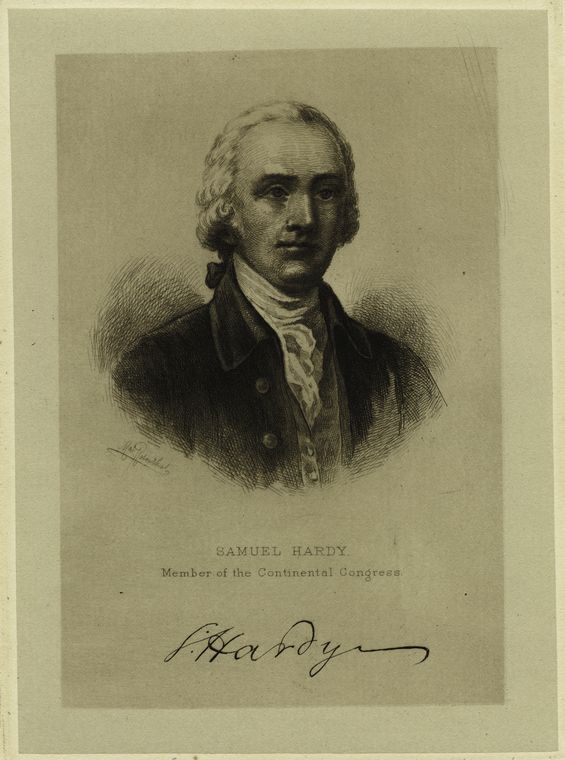Difference between revisions of "Samuel Hardy"
m |
|||
| Line 48: | Line 48: | ||
After completing his preparatory studies, Hardy attended the College of William & Mary in Williamsburg, Virginia. While in Williamsburg, Hardy studied law under [[George Wythe]].<ref>''Biographical Dictionary of the United States Congress: 1774-Present'', s.v. "[http://bioguide.congress.gov/scripts/biodisplay.pl?index=H000199 Hardy, Samuel, (ca. 1758-1785)]," accessed August 31, 2015; Mark T. Flahive, "[http://heinonline.org/HOL/Page?handle=hein.journals/abaj64&div=313&g_sent=1&collection=journals The Origins of the American Law School]," ''American Bar Association Journal'', Vol. 64 (1978), pp. 1868-1872, 1869, accessed August 31, 2015.</ref> During his time as a student, Hardy actually served as a member of the State House of Delegates in 1778, and from 1780 to 1782.<ref>Ibid.</ref> | After completing his preparatory studies, Hardy attended the College of William & Mary in Williamsburg, Virginia. While in Williamsburg, Hardy studied law under [[George Wythe]].<ref>''Biographical Dictionary of the United States Congress: 1774-Present'', s.v. "[http://bioguide.congress.gov/scripts/biodisplay.pl?index=H000199 Hardy, Samuel, (ca. 1758-1785)]," accessed August 31, 2015; Mark T. Flahive, "[http://heinonline.org/HOL/Page?handle=hein.journals/abaj64&div=313&g_sent=1&collection=journals The Origins of the American Law School]," ''American Bar Association Journal'', Vol. 64 (1978), pp. 1868-1872, 1869, accessed August 31, 2015.</ref> During his time as a student, Hardy actually served as a member of the State House of Delegates in 1778, and from 1780 to 1782.<ref>Ibid.</ref> | ||
| − | After completing his studies and gaining admittance to the bar, Hardy commenced his legal practice and became a well-known lawyer. <ref> Flahive, "The Origins of the American Law School." </ref> While practicing law, Hardy also continued his service as a Delegate for the Commonwealth of Virginia, and served on the executive council. From May to October of 1782, he served as the Lieutenant Governor of Virginia. | + | After completing his studies and gaining admittance to the bar, Hardy commenced his legal practice and became a well-known lawyer. <ref>Flahive, "The Origins of the American Law School."</ref> While practicing law, Hardy also continued his service as a Delegate for the Commonwealth of Virginia, and served on the executive council. From May to October of 1782, he served as the Lieutenant Governor of Virginia. In 1783, around the age of 25, Hardy was elected to represent Virginia to the Confederation Congress in Philadelphia and later New York City. Hardy died at his home in New York on October 17, 1785.<ref>''New-York Journal, or The Weekly Register,'' October 20, 1785, 4.</ref> Along with tributes from Congress, an elegy attributed to Alexander Hamilton appeared in the local papers.<ref>R. A. Brock, ed., ''Proceedings of the Virginia Historical Society At The Annual Meeting Held December 21-22, 1891, With Historical Papers Read on the Occasion, and Others'' (Richmond, VA: The Virginia Historical Society, 1892), 151-153.</ref> |
| − | Shortly after Hardy's death, the General Assembly named a county in his honor | + | Shortly after Hardy's death, the Virginia General Assembly named a county in his honor, located in what is now West Virginia. |
==See also== | ==See also== | ||
Revision as of 12:04, 23 November 2021
| Samuel Hardy | |
| Member of the State House of Delegates (VA) | |
| In office | |
| 1778, 1780-1782 | |
| Member of the Executive Council | |
| In office | |
| June 1781 | |
| Lieutenant Governor of Virginia | |
| In office | |
| May 29, 1782-October 11, 1782 | |
| Member of the Continental Congress | |
| In office | |
| 1783-1785 | |
| Personal details | |
| Born | ca. 1758 |
| Isle of Wight County, Virginia | |
| Died | October 17, 1785 |
| Philadelphia, Pennsylvania | |
| Resting place | Christ Church Burial Ground, Philadelphia, Pennsylvania |
| Education | The College of William & Mary |
| Profession | Lawyer, politician (congressman) |
Samuel Hardy was born sometime around the year 1758 in Isle of Wight County, Virginia, the son of Richard Hardy and a descendant of George Hardy, a representative of Virginia in the House of Burgesses from 1642-1652.[1]
After completing his preparatory studies, Hardy attended the College of William & Mary in Williamsburg, Virginia. While in Williamsburg, Hardy studied law under George Wythe.[2] During his time as a student, Hardy actually served as a member of the State House of Delegates in 1778, and from 1780 to 1782.[3]
After completing his studies and gaining admittance to the bar, Hardy commenced his legal practice and became a well-known lawyer. [4] While practicing law, Hardy also continued his service as a Delegate for the Commonwealth of Virginia, and served on the executive council. From May to October of 1782, he served as the Lieutenant Governor of Virginia. In 1783, around the age of 25, Hardy was elected to represent Virginia to the Confederation Congress in Philadelphia and later New York City. Hardy died at his home in New York on October 17, 1785.[5] Along with tributes from Congress, an elegy attributed to Alexander Hamilton appeared in the local papers.[6]
Shortly after Hardy's death, the Virginia General Assembly named a county in his honor, located in what is now West Virginia.
See also
References
- ↑ Edited Appletons Encyclopedia, s.v. (Virtualology: 2001) accessed August 26, 2015.
- ↑ Biographical Dictionary of the United States Congress: 1774-Present, s.v. "Hardy, Samuel, (ca. 1758-1785)," accessed August 31, 2015; Mark T. Flahive, "The Origins of the American Law School," American Bar Association Journal, Vol. 64 (1978), pp. 1868-1872, 1869, accessed August 31, 2015.
- ↑ Ibid.
- ↑ Flahive, "The Origins of the American Law School."
- ↑ New-York Journal, or The Weekly Register, October 20, 1785, 4.
- ↑ R. A. Brock, ed., Proceedings of the Virginia Historical Society At The Annual Meeting Held December 21-22, 1891, With Historical Papers Read on the Occasion, and Others (Richmond, VA: The Virginia Historical Society, 1892), 151-153.
